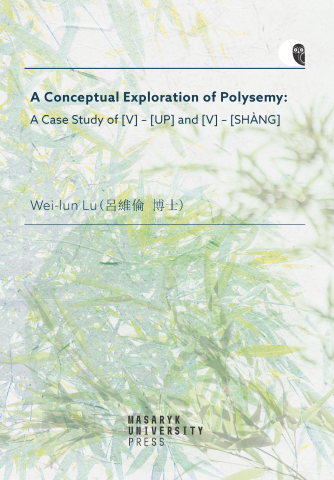Title: A conceptual exploration of polysemy : a case study of (V) - (UP) and (V) - (SHÀNG)
Variant title:
- 多義詞的認知語意研究 :以 [V] - [UP] 和 [V] - [SHÀNG] 為例
- Duōyìcí de rènzhī yǔyì yánjiù : yǐ [V] - [UP] hé [V] - [SHANG] wéi lì
-
Edition
First published
Place of publication
Brno
Publisher
Masaryk University Press
Year of publication
2022
Extent
176 stran
Series
- Opera Facultatis philosophicae Universitatis Masarykianae = Spisy Filozofické fakulty Masarykovy univerzity, ISSN 1211-3034; 515
ISBN
978-80-280-0038-7
978-80-280-0039-4 (online ; pdf)
Persistent identifier (DOI): https://doi.org/10.5817/CZ.MUNI.M280-0039-2022
Stable URL (handle): https://hdl.handle.net/11222.digilib/144929
Language
English
More
Description
- Tato studie zkoumá vzájemnou souhru polysémie, kotextu, pojmu a konstruování, přičemž pro ilustraci využívá konstrukční schéma [V] – [UP] (angličtina) a [V] – [SHÀNG] (čínština). Kromě této kognitivně sémantické analýzy se kniha zabývá též dvěma hlavními východisky kognitivní lingvistiky. Na jednu stranu jde o přesvědčení, že význam do značné míry závisí na archetypálním pojímání, což odráží základní kognitivní dispozice člověka. Současně je však subjektivita vnímána jako klíčový prvek při studiu lexikální sémantiky, a to nejen v tom ohledu, že role konceptualizujícího subjektu (tj. mluvčího) je výchozí při každém užití jazyka, ale také s ohledem na nezbytnost subjektivního mentálního "scanningu" v porozumění výrazně utlumeným lexikálním významům.
- The study investigates the interplay of polysemy with co-text, concept and construal, with the constructional schemas of [V] – [UP] and [V] – [SHÀNG] as illustrations. In addition to the cognitive semantic analysis, the monograph discusses two main beliefs in cognitive linguistics: On one hand, to a large extent, meaning depends on archetypal conception, which reflects basic human cognitive capacities. Subjectivity, on the other hand, is a critical element in the study of lexical semantics, not only in the sense that the role played by the conceptualizing subject is imminent in all usages but in that subjective mental scanning is especially necessary in understanding highly attenuated lexical senses.
License: Not specified license
Rights holder
Masaryk University
Rights access
open access
LU, Wei-lun. A conceptual exploration of polysemy: a case study of (V) - (UP) and (V) - (SHÀNG). Brno: Masaryk University Press, 2022. ISBN 978-80-280-0038-7,978-80-280-0039-4 (online ; pdf). Dostupné také z: https://hdl.handle.net/11222.digilib/144929.
Notice: These citations are automatically created and might not follow citation rules properly.
Content
| Chapter number | Title | Custom text |
|---|---|---|
| 1 | | Language, space and thought | 9–15 Lu, Wei-lun |
| Chapter number | Title | Custom text |
|---|---|---|
| 2 | | Literature review | 17–29 Lu, Wei-lun |
| Chapter number | Title | Custom text |
|---|---|---|
| 3 | | Data and methodology | 31–34 Lu, Wei-lun |
| Chapter number | Title | Custom text |
|---|---|---|
| 4 | | The core senses of up | 35–61 Lu, Wei-lun |
| Chapter number | Title | Custom text |
|---|---|---|
| 5 | | The metaphorical senses of up | 63–88 Lu, Wei-lun |
| Chapter number | Title | Custom text |
|---|---|---|
| 6 | | The core senses of shàng | 89–127 Lu, Wei-lun |
| Chapter number | Title | Custom text |
|---|---|---|
| 7 | | Subjectification, attenuation and conceptual archetypes | 129–150 Lu, Wei-lun |
| Chapter number | Title | Custom text |
|---|---|---|
| 8 | | The making of lexical meaning | 151–156 Lu, Wei-lun |
| Chapter number | Title | Custom text |
|---|---|---|
| Summary | 157–161 Lu, Wei-lun |
| Chapter number | Title | Custom text |
|---|---|---|
| 多義詞的認知語意研究:以 [V] - [UP] 和 [V] - [SHÀNG] 為例 : 內容簡述 | 163–166 Lu, Wei-lun |
| Chapter number | Title | Custom text |
|---|---|---|
| Bibliography | 167–173 Lu, Wei-lun |
| Chapter number | Title | Custom text |
|---|---|---|
| List of tables | 175 Lu, Wei-lun |
| Chapter number | Title | Custom text |
|---|---|---|
| List of figures | 175–176 Lu, Wei-lun |
| Chapter number | Title | Custom text |
|---|---|---|
| List of abbreviations | 176 Lu, Wei-lun |

